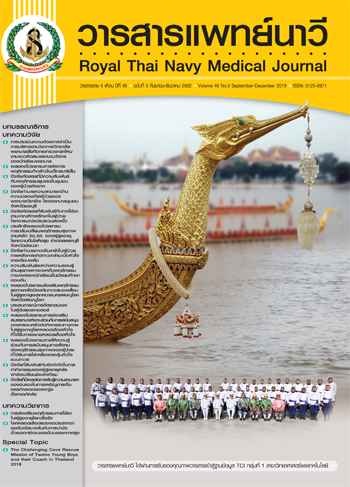The Effect of an Aggressive Behavior Management Program in Children with Attention-Deficit Hyperactivity Disorder
Main Article Content
Abstract
The purposes of this quasi-experimental research using the pretest-posttest design were: 1) to compare an aggressive behaviors of children with ADHD before and after using aggressive behavior management program, and 2) to compare aggressive behavior of children with ADHD using aggressive behavior management program and those who received regular caring activities. Forty of children with ADHD receiving services, who met the inclusion criteria, were matched pair and then randomly assigned to experimental group and control group, 20 subjects in each group. The experimental group received aggressive behavior management program for 4 weeks. While the control group received regular nursing care. Research instruments were: 1) personal data questionnaire 2) aggressive behaviors assessment scale 3) a manual of aggressive behavior management program for nurses 4) a nurses teaching manual for parents on aggressive behavior management program for caregivers 5) A home checklist on the aggressive behavior management program for caregivers. All instruments were content validated by a panel of 5 professional experts. The reliability of the aggressive behavior scale was 0.88. The t-test was used in data analysis.
The findings were as follows:
- An aggressive behaviors of children with ADHD after receiving aggressive behavior management program were significantly less than those before receiving the program at the .05 level.
2. An aggressive behaviors of children with ADHD who receiving aggressive behavior management program were significantly less than those who received regular nursing care, at the .05 level.
Article Details

This work is licensed under a Creative Commons Attribution-NonCommercial-NoDerivatives 4.0 International License.
References
Skounti M, Philalithis A, Galanakis E. Variations in prevalence of attention deficit hyperactivity disorder worldwide. Eur J Pediat 2007;166(2):117-23.
Freitag CM, Hänig S, Schneider A, Seitz C, Palmason H, Retz W, et al. Biological and psychosocial environmental risk factors influence symptom severity and psychiatric comorbidity in children with ADHD. J Neural Transm (Vienna) 2012;119(1):81-94.
Visanuyothin T, Wachiradilok P, BuranasuksakulT, Pavasuthipaisit C, Arunruang P. The prevalence of attention deficit/hyperactivity disorder. Journal of Mental Health of Thailand 2013;21(2):66-75. (in Thai).
Bezdjian S, Krueger R, Derringer J, Malone S, McGue M, Iacono GW. The structure of DSM-IVADHD, ODD, and CD criteria in adolescent boy: a hierarchical approach. Psychiatry Res 2011;188(3):411–21.
Wongkitirungruang S. How do you handle aggressive behavior?. Journal of Education 2550;30(2-3):41-7. (in Thai).
Reuangtragoon S. Textbook of psychiatry, children and teens. Bangkok: Reuangaewganpim; 2008. (in Thai).
Piyasin W. Queen Sirikit National Institute of Child Health: a guide for parents ADHD. [Internet]. [cited 2012 September 28]. Available from: https://www.childrenhospital.go.th/main/marketing/31_201249KM.pdf. (in Thai).
Ercan E, Ercan ES, Atılgan H, Başay BK, Uysal T, Inci SB, et al. Predicting aggression in children with ADHD. Child Adolesc Psychiatry Ment Health 2014;8(15). doi:10.1186/1753-2000-8-15.
Haapasalo J, Tremblay RE. Physically aggressive boys from ages 6 to 12: family background, parenting behavior, and prediction of delinquency. J Consult Clin Psychol 1994;62(5):1044-52.
Miller CJ, Miller SR, Trampush J, McKay KE, Newcorn JH, Halperin JM. Family and cognitive factors: modeling risk for aggression in children with ADHD. J Am Acad Child Adolesc Psychiatry 2006;45(3):355-63.
Strine T, Lesesne C, Okoro C, McGuire L, Chapman D, Balluz L, et al. Emotional and behavioral difficulties and impairments in everyday functioning among children with a history of attention-deficit/ hyperactivity disorder. Prev Chronic Dis 2006;3(2):A52. Epub 2006 Mar 15.
Boonsanun K. The effect of behavior therapy on aggressive behavior of children with attention-deficit/hyperactivity disorder. [Master’s Thesis, Faculty of Nursing]. Chulalongkorn University; 2012. (in Thai).
Borge L, Rossberg JI, Sverdrup S. Cognitive milieu therapy and physical activity: experiences of mastery and learning among patients with dual diagnosis. J Psychiatr Ment Health Nurs 2013;20(10):932-42.
Mancil GR, Conroy MA, Haydon TF. Effects of a modified milieu therapy intervention on the social communicative behaviors of young children with autism spectrum disorders. J Autism Dev Disord 2009;39(1):149-63.
Tatong M. The effect of nursing care emphasizing milieu therapy on aggressive behavior of hospitalized autistic children. [Master’s Thesis, Faculty of Nursing]. Chulalongkorn University; 2013. (in Thai).
Skinner BF. Science and human behavior. New York: The Free Press; 1953.
Leelanuntakit T. Management of aggressive and violent patients with the safety of patients and care takers. Bangkok: Thammasat Printing House; 1998. p. 167. (in Thai).
Grove S, Burns N, Gray J. The practice of nursing research. St. Louis: Mo. Saunders; 2013.
Jamja P, Suktrakul S, Rodcumdee B. The effect of stress management program on caregivers’ caring ability of children with attention deficit hyperactivity disorder. Royal Thai Navy Medical Journal 2019;46(1):32-48. (in Thai).
Fetemeh N, Parvaneh M, Katayoun K. Parent management training used in abusive parent-child interaction in children with ADHD. Procedia Social and Behavioral Sciences; 2010. p. 244-9.
Jansiri C. Effectiveness of implementing the caregiver training regarding behavior modification of ADHD program, Suanprung Psychiatric hospital, Chiang Mai province. [Master’s Thesis, Faculty of Nursing]. Chiang Mai University; 2013. (in Thai).


